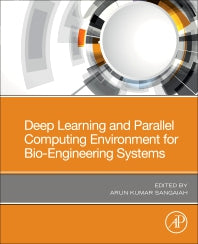Freshly Printed - allow 10 days lead
Couldn't load pickup availability
Deep Learning and Parallel Computing Environment for Bioengineering Systems
Presents concepts and technologies that are successfully used in the implementation of today's intelligent data-analytical and bioengineering systems
Arun Kumar Sangaiah (Edited by)
9780128167182
Paperback, published 27 July 2019
280 pages, Approx. 250 illustrations
23.4 x 19 x 1.9 cm, 0.57 kg
Deep Learning and Parallel Computing Environment for Bioengineering Systems delivers a significant forum for the technical advancement of deep learning in parallel computing environment across bio-engineering diversified domains and its applications. Pursuing an interdisciplinary approach, it focuses on methods used to identify and acquire valid, potentially useful knowledge sources. Managing the gathered knowledge and applying it to multiple domains including health care, social networks, mining, recommendation systems, image processing, pattern recognition and predictions using deep learning paradigms is the major strength of this book. This book integrates the core ideas of deep learning and its applications in bio engineering application domains, to be accessible to all scholars and academicians. The proposed techniques and concepts in this book can be extended in future to accommodate changing business organizations’ needs as well as practitioners’ innovative ideas.
1. Introductory
2. Theoretical results on representation of deep learning and parallel architectures for bioengineering
3. Parallel Machine Learning and Deep Learning approaches for Bio-informatics
4. Parallel programming, architectures and machine intelligence for bioengineering
5. Deep Randomized Neural Networks for Bioengineering applications
6. Artificial Intelligence enhance parallel computing environments
7. Parallel computing, graphics processing units (GPU) and new hardware for deep learning in Computational Intelligence research
8. Novel feature representation using deep learning, dictionary learning for face, fingerprint, ocular, and/or other biometric modalities
9. Novel distance metric learning algorithms for biometrics modalities
10. Machine learning techniques (e.g., Deep Learning) with cognitive knowledge acquisition frameworks for sustainable energy aware systems
11. Deep learning and semi-supervised and transfer learning algorithms for medical imaging
12. Biological plausibility/inspiration of Randomized Neural Networks
13. Genomic data visualisation and representation for medical information
14. Applications of deep learning and unsupervised feature learning for prediction of sustainable engineering tasks
15. Inference and optimization with bioengineering problems
Subject Areas: Enterprise software [UFL], Engineering: general [TBC], Technology: general issues [TB]


